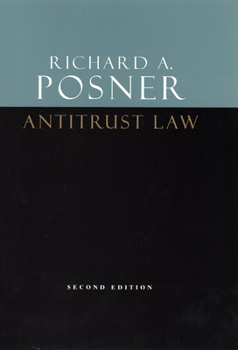Antitrust Law, Second Edition
Select Format
Select Condition 
Book Overview
When it was first published a quarter of a century ago, Richard Posner's exposition and defense of an economic approach to antitrust law was a jeremiad against the intellectual disarray that then characterized the field. As other perspectives on antitrust law have fallen away, Posner's book has played a major role in transforming the field of antitrust law into a body of economically rational principles largely in accord with the ideas set forth in...
Format:Hardcover
Language:English
ISBN:0226675769
ISBN13:9780226675763
Release Date:December 2001
Publisher:University of Chicago Press
Length:304 Pages
Weight:1.55 lbs.
Dimensions:1.0" x 6.3" x 9.3"
Customer Reviews
1 rating
Antitrust theory by Chief Judge Richard Posner
Published by Thriftbooks.com User , 25 years ago
Richard A. Posner is Chief Judge of the U.S. Seventh Circuit Court of Appeals and a professor and the University of Chicago Law School. In addition to being one of the most cited judges in U.S. legal history and one of the founders of the Law and Economics school of legal theory, Judge Posner is also one of the fathers of modern antitrust theory. This book is somewhat dated, but this is primarily due to the fact that it has been so widely read (and its policies so widely adopted) by other American judges. Up until the late 1970s, U.S. antitrust law was characterized by the pursuit of two (sometimes conflicting) goals: protecting consumers from monopolies and price fixing, and protecting "small dealers and worthy men" from larger competitors. Posner's book and a similar volume by Judge Robert Bork (The Antitrust Paradox) laid the theoretical groundwork for a seminal shift in antitrust thinking--one focusing primarily on consumer welfare.In Antitrust Economics, Posner describes in easy-to-understand terms why monopolies are bad from an economic point of view, and the shape of current antitrust law. He then lays out why some types of economic behavior that up until then had been considered anticompetitive (mergers between competitors, some types of exclusive supplier arrangements) can actually be pro-competitive or, at the least, pro-consumer. For example, while retail behemoths such as WalMart or mergers like that between Daimler-Benz and Chrysler may be devastating to smaller competitors, they may benefit consumers by generating economies of scale and lower prices.Regardless of whether one agrees with Posner's theories or the economic concentration in many industries that followed the adoption of his ideas, "Antitrust Economics" is essential reading if one wants to understand how we got to where we are and the theory behind modern antitrust law.





